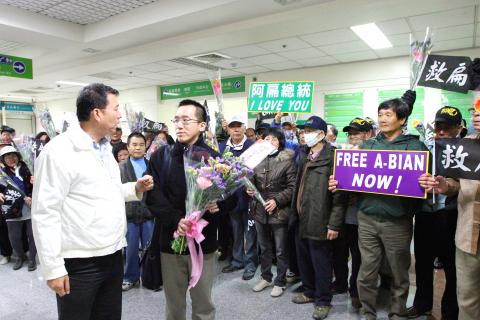|
A-bian gets
psychiatric medicine, wants to know why
NO KNOWLEDGE: The former president was given
some psychiatric medication without his knowledge while being held at Taipei
Prison, and he now demands an explanation
By Lee Hsin-fang and Lee Jung-ping / Staff Reporters

Chen Chih-chung, second left, son
of former president Chen Shui-bian, holds up a bunch of flowers and a
get-well-soon card that he received from a group of Tainan residents on behalf
of his father in Taoyuan County yesterday.
Photo: Li Jung-ping, Taipei Times
Former president Chen Shui-bian (陳水扁) has
requested that prison authorities explain why he was given psychiatric
medication when he had not asked to see a psychiatrist, Chen’s office secretary
Chiang Chih-ming (江志銘) yesterday.
Chen Chih-chung (陳致中), Chen Shui-bian’s son, said the medical team at the
government-run Taoyuan General Hospital discovered a drug normally used to treat
psychiatric conditions in the former president’s list of medications.
Chen Chih-chung, as well as Chiang and members of pro-localization groups,
demanded that Taipei Prison explain why the medication was given to the former
president, who is serving a 17-and-a-half-year prison sentence for corruption.
Chen Shui-bian underwent cardiac catheterization on Thursday to treat acute
coronary syndrome. Doctors subsequently said the syndrome could be cured by
medication rather than inserting stents.
To draw a more complete picture of the former president’s medical history,
Taoyuan General Hospital asked Chen Shui-bian to bring with him a list of past
medications received, among which was the psychiatric medication the team caring
for Chen Shui-bian found.
Chen Chih-chung questioned the motives behind the decision by doctors at Taipei
Prison to prescribe his father such medication, adding that his father did not
know about the drugs, nor had he ever asked to see a psychiatrist.
“What is this psychiatric medication used for and why was it given to my
father?” Chen Chih-chung asked.
Former vice president Annette Lu (呂秀蓮) said the drug allegedly given to the
former president was Ativan, which is usually used to treat anxiety.
Chen Chih-chung said his father had trouble breathing last night and was given a
breathing mask, adding that doctors were trying to determine whether the
symptoms were related to cardiopulmonary problems.
Pro-independence groups added their voices to the call for an explanation.
Taiwan Hakka Society chairman Chang Yeh-sen (張葉森) said doctors who prescribe
medicine are obligated to tell patients what is being prescribed, adding the
prison should provide an explanation.
If the prison doctors prescribed psychiatric medication to the former president
without telling him, then it would go against the principles of modern
healthcare, Chang said.
“Chen Shui-bian has always been strong-willed and very energetic, but recently
he’s not looking so well and he’s slightly lethargic,” Chang said, as he
questioned whether Chen Shui-bian’s deteriorating health and stress problems are
products of his prolonged confinement.
The Chinese-language United Daily News reported on Wednesday that Chen
Chih-chung had attributed his father’s acute coronary syndrome to lack of
exercise and long-time confinement in cramped quarters.
Minister of Justice Tseng Yung-fu (曾勇夫) said Chen Shui-bian was not denied his
daily 30-minute exercise and that the former president was barred from working
in factories with his fellow inmates because of security reasons as well as
respect for a former head of state.
However, Chen Chih-chung said the prison’s actions were “infringing on my
father’s human rights; it’s inhumane and unjust.”
Responding to Chen Chih-chung’s claims, Taipei Prison warden Fang Tzu-chieh
(方子傑) said the prison doctors are on secondment from Taoyuan General Hospital,
adding: “When Chen Shui-bian catches a cold, the medication prescribed comes
from the hospital.”
“The prison is uncertain of the contents of the medication and we respect the
professionalism of the doctors, so we do not ask,” Fang said.
|
![]()
![]()
![]()